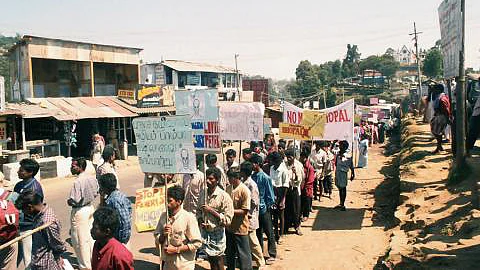It is a David vs Goliath battle.
There is the conglomerate Hindustan Unilever Limited (HUL) on one side, and former employees of its thermometer factory in Kodaikanal, their families and activists on the other.
One is unwilling to own up to its mistakes and take responsibility, the other side is fighting hard for its rights and to get what it deserves.
Stretching for over a decade now, the Kodaikanal Unilever mercury poisoning case, once side-lined by the media, has put the company in a rather uncomfortable spotlight.
Unilever Responds
On Tuesday, Unilever published a response on its website stating that they “continue to take this issue very seriously and it’s one we are keen to see resolved.”
But activists following the issue closely have punched holes in the reply calling it “insincere” and “inaccurate”.
Online campaigning platform Jhatkaa.org and the Chennai Solidarity Group have countered their claims on several counts.
What Unilever said: “...extensive studies on the health of our former workers and the Kodaikanal environment have not found any evidence of harm...”
The Counter: Unilever failed to mention findings of a 2011 Government of India (GOI) report which had been submitted to the Madras HC.
Unlike other teams which were looking into the issue, the GOI team included occupational health experts and occupational safety engineers which investigated in detail the HUL factory and their records.
They also conducted a clinical examination on 108 former factory workers, including some of their family members, of whom several showed signs of mercury poisoning. The studies that HUL does mention suffer from “crippling defects”.
In one case, the data was never shared, even with the workers, while in another observation made by the certifying surgeon were found to be inconsistent by the government. Some studies are also opinions based on information provided by HUL.
As for the adverse effects on the environment, the group points out that according to the company’s “conservative” estimate, at least 1.2 tonnes of mercury were discharged into the Pambar Shola watershed as airborne emissions.`
A study by the US Environmental Protection Agency stated that an annual discharge of 1 gram of mercury into a 20 acre lake is sufficient to contaminate the water body to a point that makes the fish unhealthy for human consumption.
Another analysis conducted by a Department of Atomic Energy on the vegetation and sediment collected from near the now closed HUL factory found high levels of mercury contamination in the samples.
What Unilever said: In March 2001, when it was found that crushed glass containing mercury had been sold to a scrap dealer, HUL closed the factory and launched an investigation.
The Counter: Unilever did not shut down the factory voluntarily. They were ordered to close the factory by the Tamil Nadu Pollution Control Board.
What Unilever said: In December 2014, the CPCB (Central Pollution Control Board) invited NGOs for consultation on the soil remediation standard, but the NGOs did not participate.
The Counter: The TNPCB had been directed to set up a Local Area Environment committee (LAEC) including NGO representatives, ex-workers representatives and residents for consultation regarding remediation.
However, of the five non-governmental representatives in the LAEC, four people that were contacted said they received no invitation to any consultation from CPCB in December 2014.
A senior official in TNPCB also admitted that no person from TNPCB attended that meeting.
What Unilever said: HUL will commence work once the soil-cleanup standard is set by the CPCB and TNPCB and they are given approval by the TNCPB.
The counter: HUL does not mention the reason for the delay, which is public opposition to its efforts to dilute the clean-up standards. The company is pushing TNPCB to dilute the standards to 25 mg/kg– 25 times less stringent than what would be permissible in the UK, their home country.
Speaking to The News Minute, Nithyanand Jayaram, an environmental activist, says that Unilever has been generally reluctant to speak on the issue.
The studies quoted by Unilever in its support are actually “one-page opinions” not based on studies, he says.
None of these agencies ever set foot in Kodaikanal. They did not conduct any independent probe or examined the workers.
— Nityanand Jayaram, Environmental Activist
There however seems to be a silver lining. Nithyanand feels that though their recent response is not very different from what they said eight years ago, this time around they have spoken up about their interest “to find a fair and mutually satisfactory resolution”. “That is good,” he says.
Sofia Ashraf’s rap video “Kodaikanal won’t” seems to have worked in ways the makers would never have imagined. Recently a HUL official was quoted by two media organisations on the issue.
Initially, most queries were directed to the statement on their website. This is probably the first time that an official from the company has directly answered a question.
— Nityanand Jayaram, Environmental Activist
14 years is a long wait. Nithyanand is hopeful though. “We have come this far, there’s a little more to go,” he says.
(The story originally appeared in The News Minute)
